People all over the world love Hawaiian hula dancing, and serious hula dancers have much respect for their kumu (teachers). Haumana or students join halau (schools) based on the styles, traditions and reputation of the kumu. In Hawaii, it’s common for some haumana to remain in the same halau for years, ranging from keiki (children) to kupuna (elders).
Hula knowledge is traditionally passed down over years of rigorous training and performances. Kumu learned the same way from their kumu— who might be someone in their own family lines. Even if not, kumu often trace their respective hula genealogies.
At the discretion of some kumu their best students might uniki (graduate). They become an olapa, (dancer), a hoopaa (chanter), or a new kumu, who does both. It’s common to hear such graduates talk about their hula brothers and sisters for the rest of their lives, and they almost always pay a great deal of allegiance to the kumu who taught them and the traditions they learned.
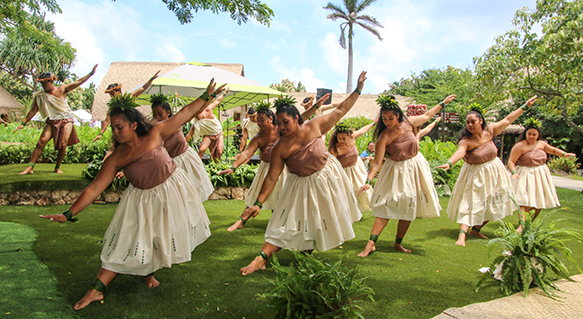
Hui Hooulu Aloha, the Polynesian Cultural Center’s halau, performs the first official hula during the closing day of the 29th annual Moanikeala Hula Festival on the PCC’s new hula mound, a low stage of ancient origin.
Moanikeala Hula Festival honors “Aunty” Sally
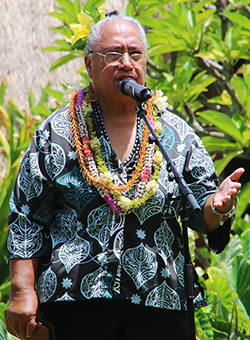
Ellen Gay Dela Rosa, niece of Aunty Sally and one of her hula graduates.
On September 7, 2019, the Polynesian Cultural Center’s Hawaiian Village concluded the week-long 29th annual Moanikeala Hula Festival honoring the memory of the late “Aunty” Sally Moanikealaonapuanakamahina Wood Naluai — our very first kumu hula. The Center’s current kumu, Pōmaikai Krueger, a young man with family hula ties in Laie and Maui, first asked PCC kumu hula and retiree Ellen Gay Kekuaokalani Dela Rosa, to share some background information on Aunty Sally, who is her actual aunt.
Dela Rosa explained Aunty Sally was born on Maui but raised in nearby Kahana. She traveled extensively as a young performer and gave up her own hula studio in Kaneohe when she agreed to become PCC’s first kumu in 1963. “She did so much for the Center,” Dela Rosa said. Aunty Sally retired from PCC in 1980, but she continued to work as a hula consultant until passing away in 2000.
Almost 30 years ago Dela Rosa’s sister, Victoria “Sunday” Kekuaokalani Mariteragi, convinced the Cultural Center to start the Moanikeala Festival. Though still a sophomore in high school, Aunty Sally drafted her niece as one of the original PCC hula dancers. Later, under her aunt’s tutelage, Meriteragi went to uniki along with her sister Dela Rosa and hula brothers, Keith Awai and Cy Bridges. She worked most of those years at nearby Kahuku High School, and with Aunty Sally’s encouragement, started her own halau for children in 1981. By special arrangement, her group continues to practice at the Polynesian Cultural Center.
“On behalf of my family, I want to thank the Hawaiian Village for honoring Aunty Sally,” Dela Rosa said.
“Thank you, Aunty Ellen Gay,” Krueger responded. “These kupuna, people who raised us and taught us, are so important that we continue to remember them and tell their stories.”
PCC’s Hawaiian Village “unveils” new pa hula
Before starting the festival’s final hula offerings, Krueger also officially dedicated the Hawaiian Village’s new pa hula, a slightly elevated stage-like mound based on ancient origins.
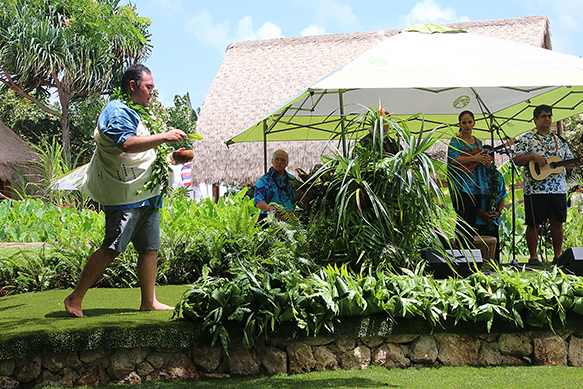
PCC kumu hula Pomaika’i Krueger (left) performs a traditional blessing on the Polynesian Cultural Center Hawaiian Village’s new pa, a hula stage of ancient origin. The new pa is named Ululauieie after the leaves of the ieie plant in the center.
Krueger explained the new pa is named Ululauieie. “Ulu means to grow [in Hawaiian],” he said, “and lauieie are the leaves of the ieie, a very significant plant in Hawaiian culture. Its blossom represents a royal birth and it was sacred to Laka, the ancient goddess of hula. The leaves of the plant are also where Laie gets its name.”
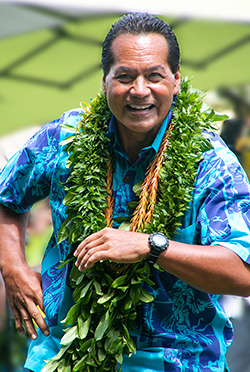
PCC retiree and kumu hula Keith Awai shares an impromptu hula during the 2019 Moanikeala Hula Festival.
“We hope giving this name to this stage will help it to become an elevated area for people to showcase excellence in hula,” he continued. “All the practice and growth that many students have given will be displayed on this stage. This is also where we will share our hula lessons with many visitors from around the world. This is a space for them as well, as they learn and interact with us.”
In a prayer for the day, kumu hula and PCC retiree Keith Awai asked that “this hula platform may be a place of sharing knowledge of cultural practices and opportunities to learn, but most of all to enjoy hula.”
Hula dancers take over
How do Hawaiians honor kumu and hula? With different halau sharing their hula and beautiful Hawaiian music, of course. Krueger first called up Hui Hooulu Aloha, the Polynesian Cultural Center’s own halau, which was started almost 40 years ago. It consists of PCC Hawaiian Villagers, BYU-Hawaii students and interested dancers from the community.
Delsa Atoa Moe, PCC Vice President of Cultural Presentations, noted that “Hui Hooulu Aloha came away the overall winner for a recent hula competition held on Maui. They won first place in men’s kahiko and auwana [older and modern styles, respectively] in the group competition; and Beau Schwenke won in the men’s solo competition, too. Kelsey Saifoloi Mauai won the women’s solo competition last year.”
For their first number, they performed a traditional hula “used today in calling together all the Hawaiians and all the people who call these islands home,” said Krueger. “This hula also reminds us that we are always connected to our ancestors.”
For their second number, the PCC halau did an oli or chant composed by Hawaiian Village manager Naauao Panee which describes how the villagers work with their hands and tell the stories of their ancestors.
“We do it together. We do it humbly, and we do it for our people and the pride of our nation,” said Krueger.
Other participating halau
- Ka Pa Nani O Lilinoe from Aiea, Oahu, kumu Lilinoe Lindsey . . . has been appearing at the Moanikeala festival for many years.
- Kawaipu’ilani from Haleiwa, Oahu, kumu Keith Awai.
- Hu’i Park Hula Studio in Torrance, California, kumu Ikaika Dutro.
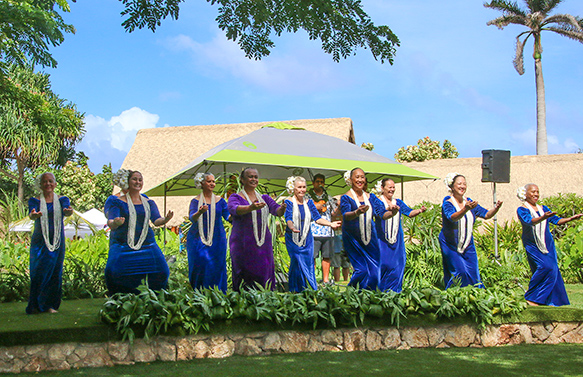
Laie’s own Hula Halau O Kekela, led by kumu Kekela Miller (center, front row), frequently support Polynesian Cultural Center and local community activities.
- Hula Halau O Kekela from Laie, Oahu, kumu Kekela Miller.
- Halau I Kalimakuhilani from Kahuku, Oahu, kumu TC and Kuhi Irvine-Preston.
- Uncle Lincoln Ukulele Halau from San Clemente, California, kumu Lincoln Kaio (who is originally from Laie).
- PCC’s own Hui Ho’oulu Aloha halau also performed again at the end of the day’s program . . . as did some of the kumu who danced to Aunty Sally’s name-song, Moanikeala.
The festival also included a craft fair, a Hawaiian food booth, and fresh pai ai — the first stage of pounding boiled kalo (taro) into poi.
Other events earlier in the week
- Hukilau fishing (pulling nets, under the direction of Robert Kahawaii and his family) at Clissold’s Beach;
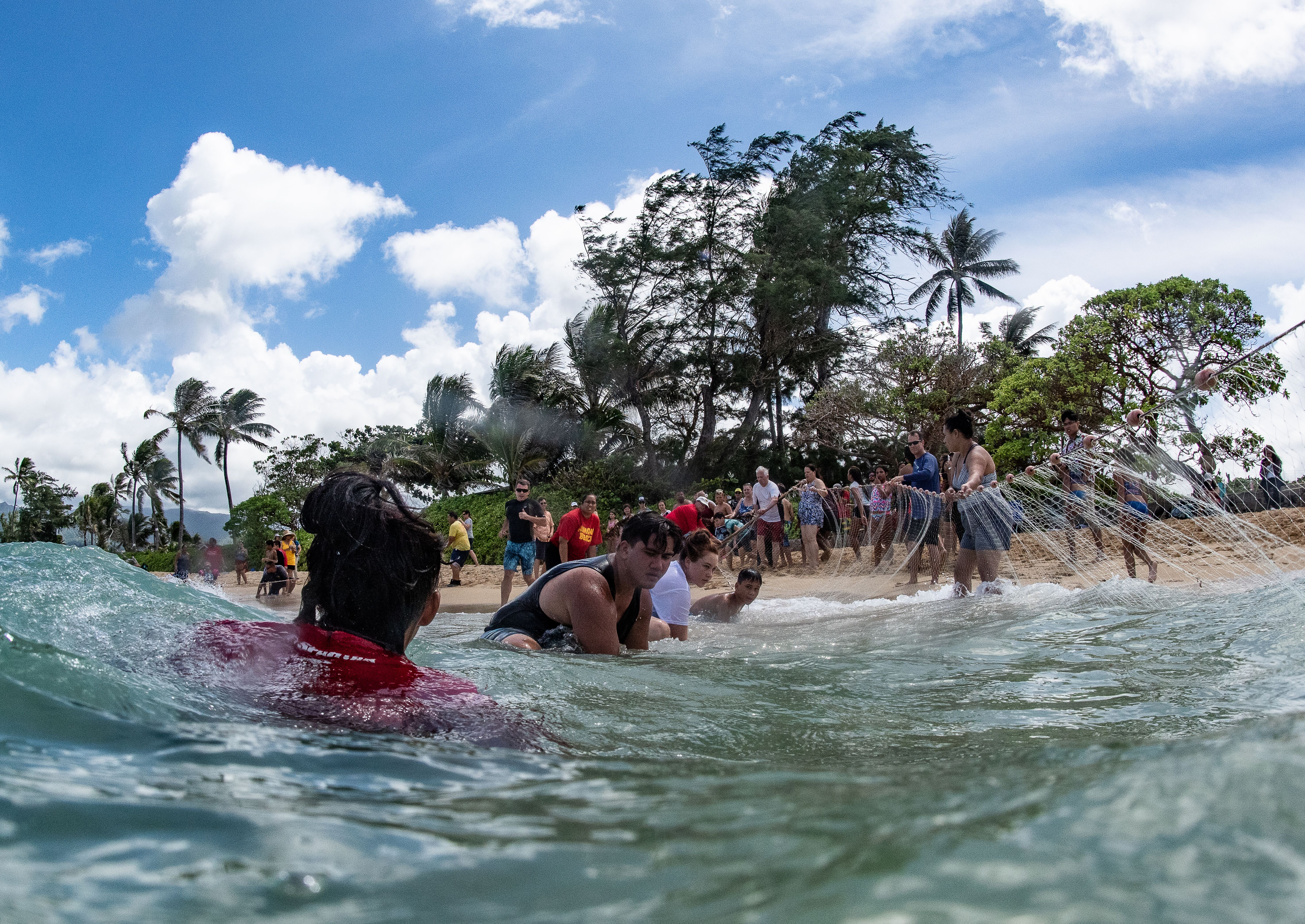
A beautiful day greeted participants in the opening Hukilau event.
- traditional lauhala (pandanus leaf) weaving
- hula instruction by Pomaika’i Kreuger
- traditional Hawaiian wayfinding or sailing canoe navigation by Kawika Eskaran
- and a concert featuring the Pomaika’i Serenaders and Ei Nei
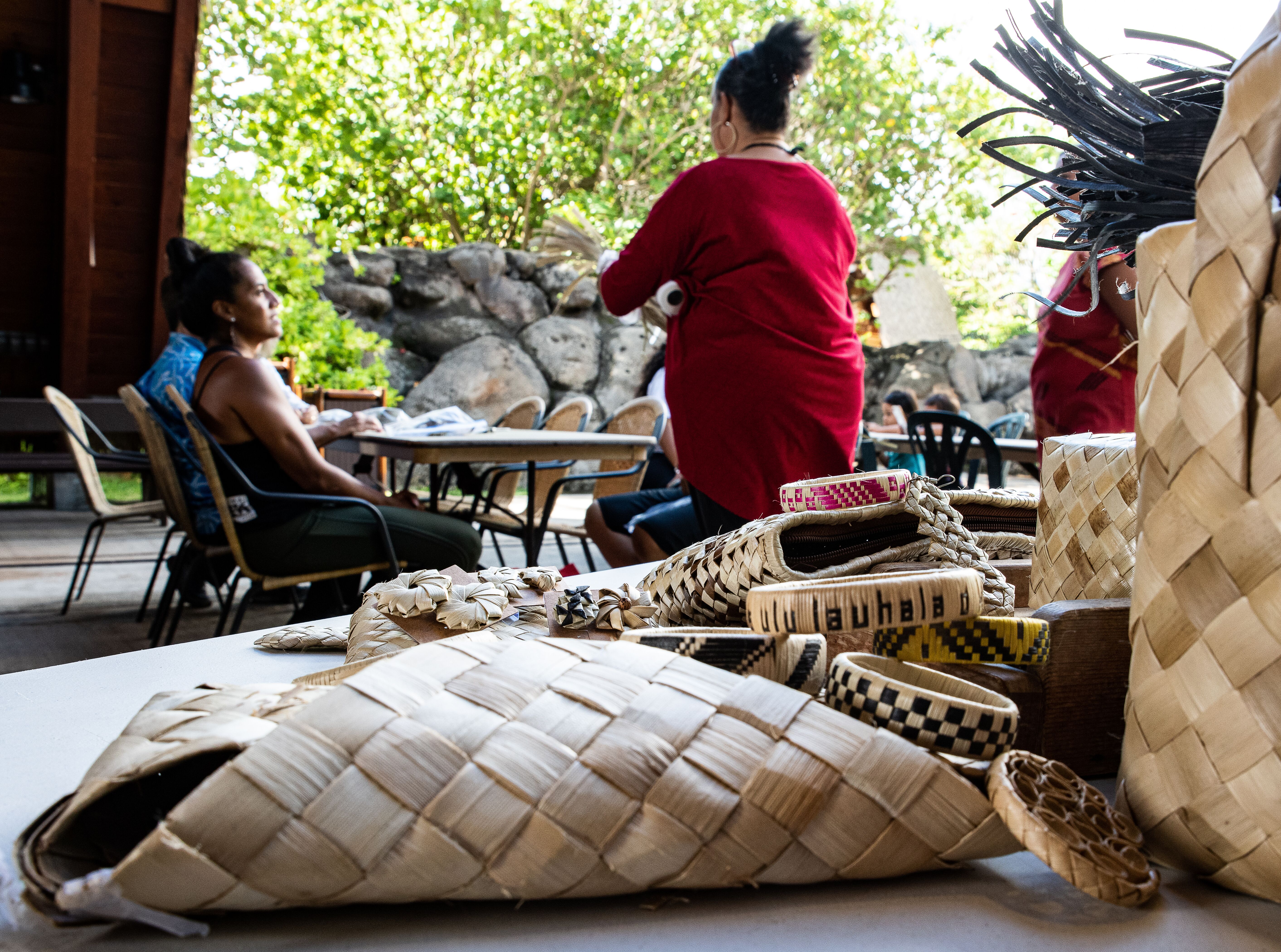
Lauhala class at the Center
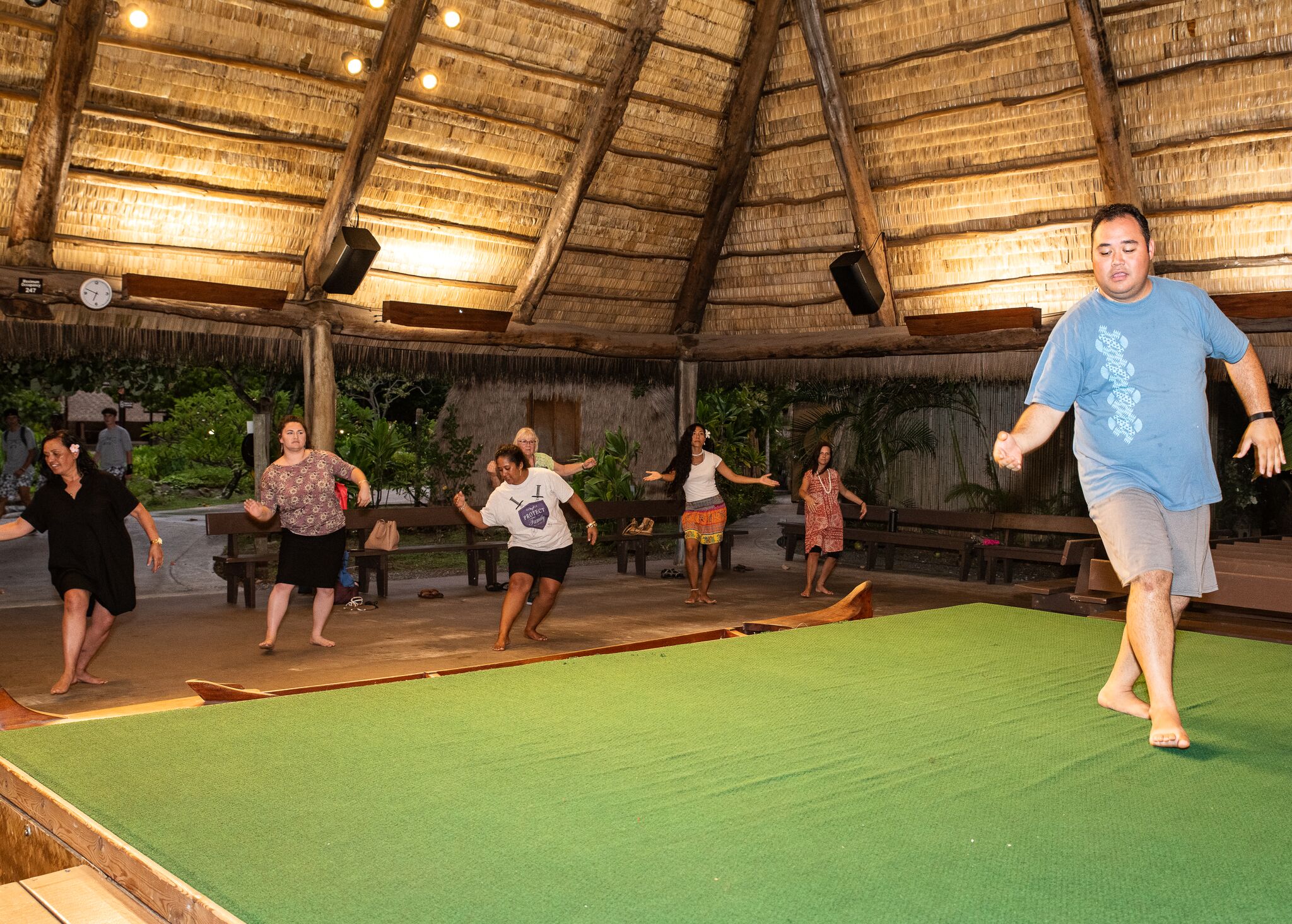
Pomai Krueger holds a hula workshop
At the Courtyard by Marriott Oahu North Shore Hotel:
- An opening ceremony
- ukulele class by Kimo Hussey
- Niihau shell lei making by Lokahi Orian of Haaheo Hawaiian Crafts
- the situation at Mauna Kea by kumu hula Pele Kaio; a session was also held at the Turtle Bay Resort
- Hawaiian fishponds by Kelii Kotubetey of Papae o Heeia Fishpond in Kaneohe
- an imu (Hawaiian oven) presentation led by Vonn Logan of Laie
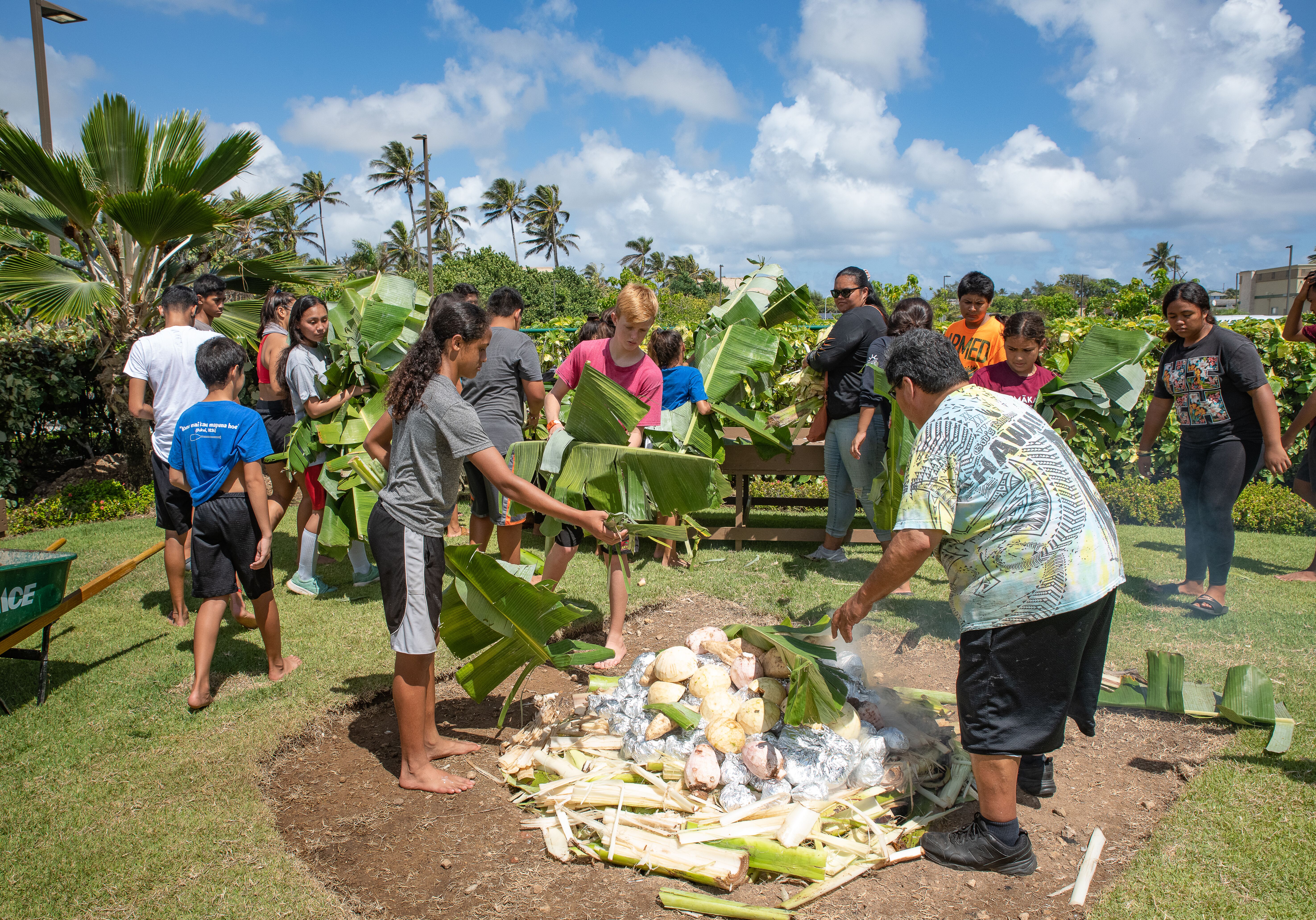
An imu workshop at the Courtyard
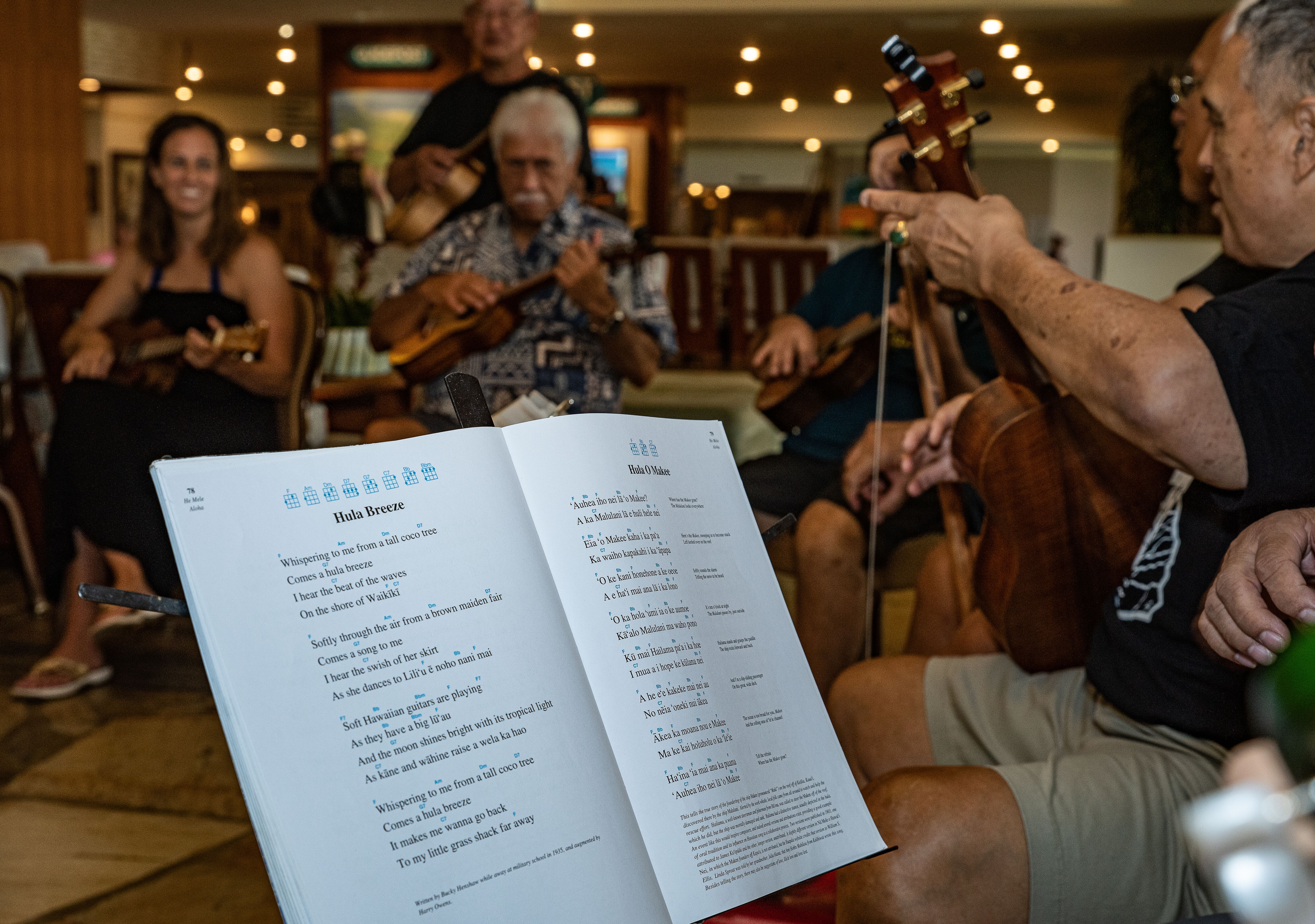
Ukulele enthusiasts gather for a kanikapila at Turtle Bay
We are looking forward to the 30th annual Moanikeala Festival next year. Hope to see you there.
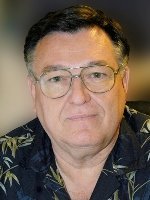 Story and photos by Mike Foley, who has been associated with the Polynesian Cultural Center for over 50 years. He had a long career in marketing communications, PR, journalism and university education before becoming a full-time freelance writer and digital media specialist in 2002. Foley learned to speak fluent Samoan as a Latter-day Saint missionary before moving to Laie in 1967, and he still does. He has traveled extensively over the years throughout Polynesia, other Pacific islands and Asia. Though nearly retired now, Foley continues to contribute to PCC and a select few other media. Almost 50 years ago he married one of Aunty Sally’s hula dancers.
Story and photos by Mike Foley, who has been associated with the Polynesian Cultural Center for over 50 years. He had a long career in marketing communications, PR, journalism and university education before becoming a full-time freelance writer and digital media specialist in 2002. Foley learned to speak fluent Samoan as a Latter-day Saint missionary before moving to Laie in 1967, and he still does. He has traveled extensively over the years throughout Polynesia, other Pacific islands and Asia. Though nearly retired now, Foley continues to contribute to PCC and a select few other media. Almost 50 years ago he married one of Aunty Sally’s hula dancers.

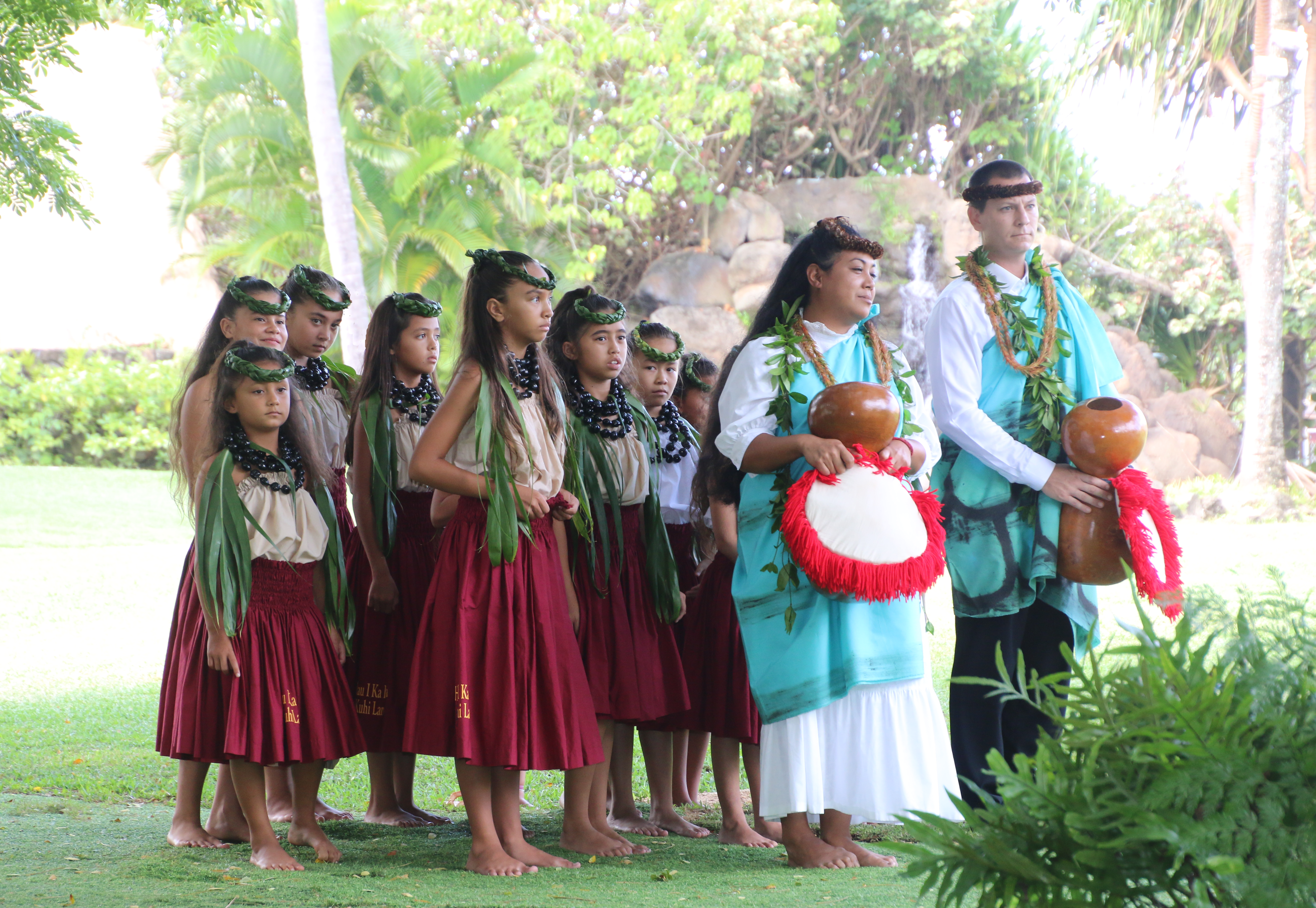
Recent Comments